

Some of the most popular extensions block ads from appearing on websites, with two, Adblock Plus and uBlock Origin, generally earning high reviews from users. Some extensions, such as LastPass, help manage your passwords, while others, including the Evernote Web Clipper and OneNote Web Clipper, make it easier to archive snapshots of websites for later retrieval. Regardless of which browser you use, extensions (also known as add-ons) are small pieces of software that add useful features. Goodbye, autoplaying video!Īs mentioned above, there's no built-in setting for Chrome that lets you turn off autoplay for videos, but you can do it by using a browser extension. The next time you go to a website that has autoplaying video, you have to select the new Debug menu option at the top of the screen and then scroll down to Media Flags and Disable Inline Video.

This scary-looking string merely allows you to access an additional settings menu inside Safari called Debug. You'll need to open the application called Terminal (which is found in your Utilities folder), then paste in the following text (without the quotation marks): "defaults write IncludeInternalDebugMenu 1".

If you don't have the latest version of Safari-say, if you're using a work-provided laptop that has an older version of macOS-it's a bit trickier to pull off. Safari: If you use Apple's Safari browser as your daily driver, you may be wondering to yourself, "What's autoplay video?" That's because in the newest versions of Safari (starting with version 11, released in 2017), most autoplaying videos are blocked. This method won't typically block videos in the older Adobe Flash format, but we'll explain how to do so below. This will disable most HTML5-based videos from playing on their own when you load a page. Next, search in the window for the "" setting and double-click it. It's straightforward, but not something you'd stumble across by searching through pull-down menus.įirst, you'll need to access the browser's advanced options by typing "about:config" (without the quotation marks) in the address bar and hitting Return. (See the Extensions section below.)įirefox: Mozilla's recently revamped Firefox web browser offers a straightforward way to prevent unwanted videos from playing automatically as you hop from site to site. To stop video that does not contain sound, you can use a third-party extension. Chrome: Google recently released Chrome 66, a new version of the popular desktop web browser, which blocks by default autoplay video that contains sound.


 0 kommentar(er)
0 kommentar(er)
